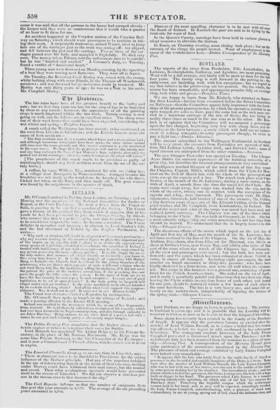SCOTLAND.
The reports of the crops front Perthshire, Fife, Lanarkshire, the Lothians, Roxburghshire, Galloway, and Ayrshire, are most promising,
Wool will be a full average, and lambs will be more so than for the last four years. The turnip crop is well forward in the putting in; the early-sown are brairding well, with few exceptions ; but we regret to say that failures in the potato-crop are too general. On the whole, the season has been remarkable, and appearances promise fully an average crop, both white and green.—Dany'ries Times.
ll'e are happy to learn from Mr. Kinloch, who returned on Satur- day from London—having been examined before the Select Committee on Railways—that the Committee appear fully impressed with the hard- ships of the present passengers-tax, by which the operative, carried in an open waggon fire miles an hour, pays the same tax as the rich man car- ried in a luxurious carriage at the rate of thirty; the tax hieing in reality three times as much in the one case as in the other. Mr. Kin- loch is of opinion that the Committee will recommend a percentage upon the fare charged, beginuing very low with cheap fares, and in_ creasing as the litres increase ; a mode which will hold out an induce- ment to railway companies to carry passengers cheaply, in order to pay a ligitt km —Dundee Advertiscr.
The amount subscribed to the Wellington Testimonial in Scotland will be very great: the accounts from Perthshire are upward of 800/., front Mid Lothian laitio/.„‘yrshire 600/., and Berwick -100/.; stuns of equal amount are anticipated from the other counties.—Seolsman.
The new Glasgow Post-office was opened on Tuesday. The Glasgow Argus thinks the outward appearance of the building unworthy of a great city, but describes the internal arrangements as very convenient Intelligence reached Glasgow of the total wreck of that fine vessel the Chipewa, Captain Miller, which sailed from the Clyde for Mon. treat on the 30th of March last, with the whole of the passengers and crew, except the captain and a boy. The wreck took place near Cape Rozier, at the mouth of the St. Lawrence, during a snow-storm, on the 30th of April, a month front the time the vessel left the Clyde. Her masts were swept away, her cargo was washed into the sea, and the whole of the crew, twenty-one in number, with the exception of the captain and a boy, were drowned. The passengers were Mr. Glass, shipmaster, Greenock, half-brother of one of the owners; :qr. Collins, a boy fourteen years of age, son of Mr. Edward Collins, of the Dalmuir print-worts; and Mr. Campbell, from Londonderry, in Ireland. The hull of the vessel and what of the cargo was saved had been sold, and realized 2,000/, currency. The Chipewa was one of the finest vessels belonging to the Clyde. She was built at Greenock, in 1838. Shebat a most valuable cargo—ship alit: cargo amounting to not less than front 50,000/. to 60,000/. We understand that she is largely insured in this City.—Glasgow Courier.
The disastrous effects of the storm which raged on the last day of April and first day of May, near the mouth of the St. Lawrence, have not been conlined to the loss of the Chipewa. On the 1st of May, the Arabian, Greenhorn, also front Glasgow for Montreal, was driven on shore at Griffin's Cove, near Gaspe Bay, and within nine miles of that
part of the coast where the wreck of the Chipewa lay. Fortunately, all the crew and passengers were saved ; but the bark has been con- demned; and the cargo, which has been estimated at about 70,000f. in value, is almost all damaged. Including eight passengers, the total number on board amounted to thirty-five persons ; wien have been kindly sheltered in a farm-house, and were all well when the accounts left. ller cargo in this instance was a general one, consisting of goods fitted for the British American trade. She sailed on the 1st of April; and it really is peculiarly painful and disastrous that two first-rate stiles,
leaving the Clyde within twenty-four hours of each other, and bound for one port, should lie destroyed within a few hours of each other in the saute hurricane. The loss is a very heavy one, and must fall se• verely on the uuderwriters, independently of injuring the returns of the spring trade.—Glasgow Courier.


























 Previous page
Previous page